Category: Uncategorized
Nervcited! Starting the Camp Countdown Chat with Your Camper
If your child is attending camp for the first time they might be starting to feel butterflies in their tummy. What is it going to be like? Am I going to make friends? What if it’s scary? Will my counselors help me?
These are all completely understandable questions and we’d be surprised if your camper didn’t feel a little nervous for the experience. Simply by coming to camp your child is stepping out of their comfort zone and taking what feels like a risk. They don’t know what the outcome will be and therefore it feels new, exciting and possibly scary too.
However, we know that children who step out of their comfort zones and engage in healthy risks build greater resilience, confidence, decision-making skills and are more tolerant to stressful situations in the future (1).
As an article from the American Camp Association states, “Resilience is the answer to the doubts we have as parents. Won’t he miss me? What if she gets sick? Homesickness, bug bites, disappointments, and injuries all can be weathered without mom or dad. As the camp doctor at a fantastic overnight camp, I can tell you that kids do look for a parent in those moments. And then they surprise themselves as they turn to counselors, new friends, and their own inner strength to get through and get over the hardships. What pride and self-confidence they discover as they learn of their own resilience” (2). While we know that the outcomes can be great, the process isn’t always easy.
In order to best set new campers up for success it’s important to be open with them about what they may face in this very new environment. Yes, they will have a really great time and sometimes they might really miss home while they’re doing it. And yes, they will make friends, and they might occasionally have a disagreement/differing opinion with one of their unit mates. It’s okay to have these conflicting experiences at once – they are in a safe place to process it. Just because you have difficult moments or feelings that you don’t enjoy, doesn’t mean that the whole experience is bad or that you’re not brave enough to be there!
While at camp, your camper is surrounded by adults who genuinely care about them. Our staff has been trained in how to help when a camper feels homesick or is having conflict with another camper. They also make sure to celebrate the moments, big or small, when your camper has learned something new, gone on their first big hike, or gotten on stage to perform in the drama. If your camper is ever experiencing feelings that are difficult to process, we have a team of directors who will stay with your camper for as long as it takes to work through those emotions. Then we’ll make a plan on how to move forward. We’re always here and ready to help whenever your camper needs it.
We’ve found that campers who have talked through their anxieties, goals and hopes for camp before arriving are often better at processing those tough emotions independently when they arise. Reminding your camper that they’re brave even when they miss home, and that they’re strong enough to keep going is awesome. Similarly, a reminder that their counselors and the leadership team are here to support them whenever they need it is great too. Below we’ve listed some questions that might help start the conversation!
- What are you MOST excited for?
- What are you most nervous about?
- What do you think it’ll be like living in a cabin for a week or two?
- I know we’ll miss each other while you’re gone but I know you’re going to have so much fun. You’re brave and strong and we know that you can do it. What are some things that might help if you get a little sad while you’re there?
- Are you interested in making new friends? What are some ways you could do that?
- What would you do if there was someone who you don’t get along with?
- On the first night of camp there will be a cabin meeting in your cabin where everyone gets to talk about how to live together. Do you have any ideas on what rules you think might be helpful?
- Is there anything you want to be sure your counselor(s) know about you?
- Are there any new things you want to try? New food, skills, etc.
- What’s one thing you want to make sure to accomplish before you go home?
- Make sure you tell your counselor when you get there so that they can help you with that goal!
This is just a jumping off point as you and your camper consider what their camp experience might be like. Campers may have times where camp is a huge challenge for them, but often those are the moments where they’re growing the most. Ultimately, we hope that “learning respect, resilience, and responsibility at camp will establish each (camper) as a person who can achieve his or her dreams” (2). We’re proud of you and your camper for taking this leap and trying something new! We can’t wait to see you this summer!
- “Bright Horizons | Risk Taking in Early Childhood: When Is It Appropriate? | Bright Horizons?” Brighthorizons.com, Bright Horizons, 2024, www.brighthorizons.com/article/children/risk-taking-benefits-children.
- Gilboa, Deborah. “Imagine Respect, Inspire Resilience, Impact Responsibility.” American Camp Association, 29 Sept. 2015, www.acacamps.org/article/camping-magazine/imagine-respect-inspire-resilience-impact-responsibility.
Disconnect to Reconnect: The Impact of Being Surrounded by Nature
At Mountain Camp, everything we do is outside. We eat outside, play outside, and sometimes even sleep outside! We love that we’re able to fully connect with nature in all the various aspects of our camp lives. During our weeks at camp, we’re not just surrounded by nature, we’re fully immersed. And we can say with first hand experience, the benefits are immense.
At camp we’re able to disconnect from screens and spend more time face to face with one another. We collaborate with each other at meals, share our spaces kindly and to accomplish big things (like going to camp for the first time) together! We spend less time worried about getting to the next thing and instead get to take our days slowly and more mindfully. When children are disconnected from technology their creativity thrives. As stated in an article from the Child Mind Institute, an “unstructured style of play also allows kids to interact meaningfully with their surroundings. They can think more freely, design their own activities, and approach the world in inventive ways” (1). One of the places where we see this creativity really come out at Mountain Camp is at the Forts.
Forts is a big area up in the woods filled with leaves, sticks and huge trees – no playground equipment in sight. Over the decades camp has been running, campers have turned this space into a fort building paradise. Campers often go to this activity with their unit mates and collaborate to create huge forts using just the things they can find on the ground. It’s not only fun and a great way to deepen connections with one another, it’s impressive too! Several campers have turned a bunch of branches and sticks into triple decker forts with fence lines, shelter areas, and places to hide their treasures.
Campers also report feeling less stressed at camp than anywhere else, and they tell us that they sleep better here too! It can be hard to say what exactly is the main cause of these benefits, as there are so many reasons that could be the case at camp. We have long, physically active days and three wonderfully healthy meals. We’re surrounded by friends and get to fall asleep giggling with one another while reflecting on everything we’ve accomplished. We’re reading instead of scrolling. And we’re more aligned with our circadian rhythms; up just a bit after sunrise and asleep an hour or two after sunset.
For our two-week campers, all campers have the opportunity to go on an overnight at camp which presents the perfect chance to be 100% immersed in nature. This involves paddling out to the other side of the lake (or going to Mountain Camp’s waterfront for our younger campers) and sleeping out under the stars, cowboy style. Each night, we can see the milky way, and if we are lucky, a few shooting stars! Having this opportunity to watch the sunset and just marvel in the beauty of the forest while giggling and bonding with their cabins is a memory that many campers never forget, for good reason!
In a comprehensive study done by Marcia Jimenez, they found associations “between nature exposure and improved cognitive function, brain activity, blood pressure, mental health, physical activity, and sleep” (3). And in an article by the American Psychological Association they stated; “people who feel more connected to nature have greater eudaimonic well-being—a type of contentment that goes beyond just feeling good and includes having meaningful purpose in life (Journal of Happiness Studies, online first publication, 2019)” (4).
Our connection to nature doesn’t have to be something we just experience at camp. We can go on a family camping trip, go for a walk in our neighborhood park, have a picnic, or take part in a local clean up on earth day. Even just 15 minutes of time in nature per day can significantly improve our cardiovascular health by reducing our blood pressure and resting heart rate (2). Nature is part of who we are and we’re grateful to be able to share our love of nature with all of you. As San Francisco native Gary Snyder states; “”nature is not a place to visit, it is home”, we couldn’t agree more.
- Cohen, Danielle. “Why Kids Need to Spend Time in Nature.” Child Mind Institute, 9 Feb. 2016, childmind.org/article/why-kids-need-to-spend-time-in-nature/.
- “How Even Just 15 Minutes in Nature Can Boost Your Wellbeing.” Loughborough University, 3 Jan. 2025, www.lboro.ac.uk/news-events/news/2025/january/how-short-time-in-nature-boost-wellbeing/.
- Jimenez, Marcia P. “Associations between Nature Exposure and Health: A Review of the Evidence.” International Journal of Environmental Research and Public Health, vol. 18, no. 9, 30 Apr. 2021, www.ncbi.nlm.nih.gov/pmc/articles/PMC8125471/, https://doi.org/10.3390/ijerph18094790.
- Weir, Kirsten. “Nurtured by Nature.” American Psychological Association, vol. 51, no. 3, 2020, www.apa.org/monitor/2020/04/nurtured-nature.
Outdoor Cooking at Camp
Outdoor cooking is an exciting activity at Mountain Camp which gives campers the opportunity to prepare, cook and eat their own food. It is a popular activity which is offered for each age group at Outdoors sign-ups, runs for one and a half hours and attracts approximately 25 campers each activity period.
Both sweet and savory treats are cooked at outdoor cooking including banana boats, chocolate chip brownies inside an orange, popcorn balls and the most popular foods are pizza pockets and s’moretillas.
To make pizza pockets campers add pizza sauce and their choice of cheese and/or pepperoni onto half a pizza base. This is then folded over, the edges are sealed to trap all of the pizza-goodness, wrapped in aluminum foil and finally placed on the grill over the fire to crisp and turn a golden – brown. Campers then bite into the melted cheese/pepperoni goodness and each pocket is always devoured!
Step 1:
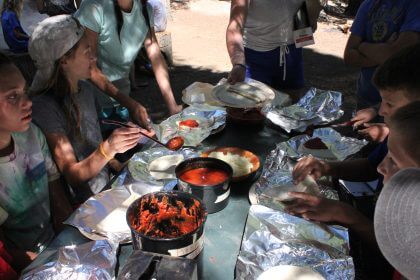
Step 2:
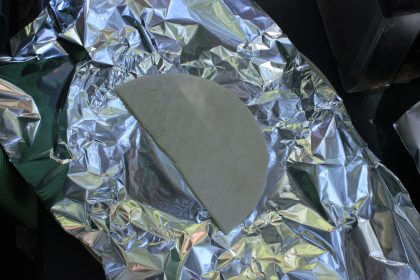
Step 3:
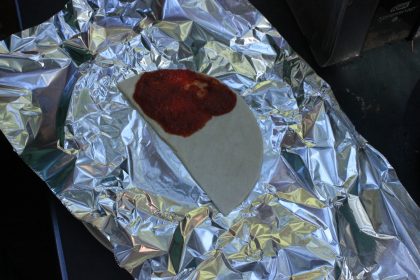
Step 4:
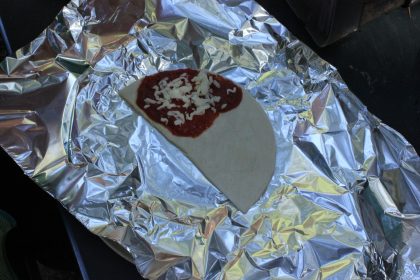
Step 5:
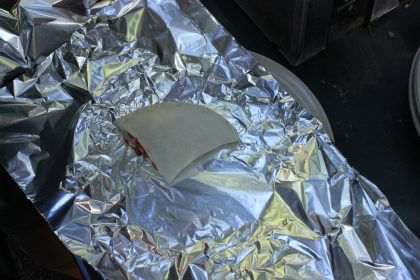
Step 6:
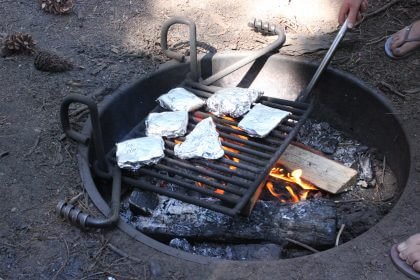
Step 7:
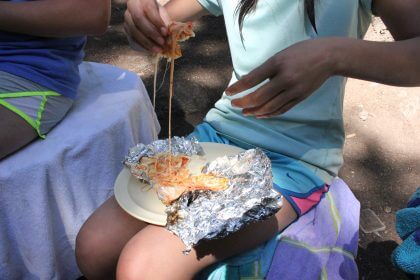
Step 8:
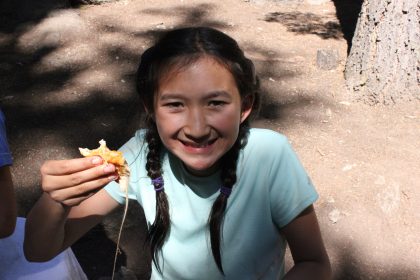
Happy, smiling faces are always on display at the end of outdoor cooking after the campers devour their delicious treats!!
The Ropes Course
Attention first year, and returning campers alike!
Our Ropes Course was given a facelift in the months prior to the Summer 2016 session. This brief blog will highlight a few of the most exciting changes our campers will find down at Ropes this year.
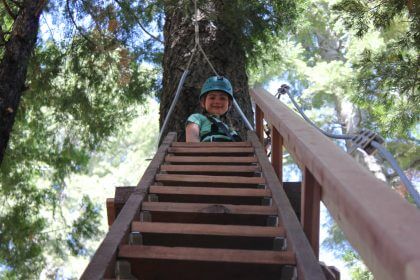
Our Zipline, the centerpiece of the Mountain Camp Ropes Course, has now been extended by about 40 feet. The extension of our line has allowed climbers to smoothly zip all the way to the ground, gently landing on their own two feet.
Grandest of all the updates were the changes made to our Lobster Claws course.
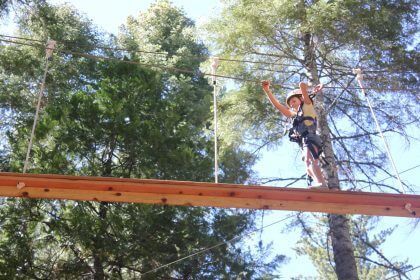
The Lobster Claw course is essentially all of the elements anchored in the tree canopy at the Ropes Course that are not within reach of the ground. While the majority of the elements of our course are the same, the belay system that our climbers use to safely negotiate these off the ground obstacles has been replaced by a new system: the C-Hook (the latest advancement in challenge course tech). By adopting the C-Hook system we have been able to eliminate the requirements that came along with our old Lobster Claw course. No longer will blazers be turned away because of the height requirement, nor will one week campers be prevented from accessing areas of our course that required longer training. The new belay system also gives our climbers a more complete autonomy up in the trees. Campers choose the elements that they traverse across, and transfer their own C-Hook’s accordingly.
Age Group Songs
Singing and chanting is one of the aspects of camp that make it such a unique place and keeps it so different from school and everyday life. Rarely do you eat every meal with 300 other people, and spend more of it standing up, chanting, dancing or singing than you do sitting down and eating your delicious meal.
At Mountain Camp campers are divided into three different age groups, the Trailblazers, Trackers and Alpiners, each with their own song. Age groups get a chance to practice their song on Sunday as soon as they arrive at camp and then spend all week belting it out at mealtimes, competing with other campers to see who can sing the loudest.
The age group songs have been around as long as Mountain Camp and all have their own unique and special quirks. Why read about it when you can WATCH IT in action! Check out of video below of the session 3A Trailblazers singing the Trailblazer song with their counselors.














